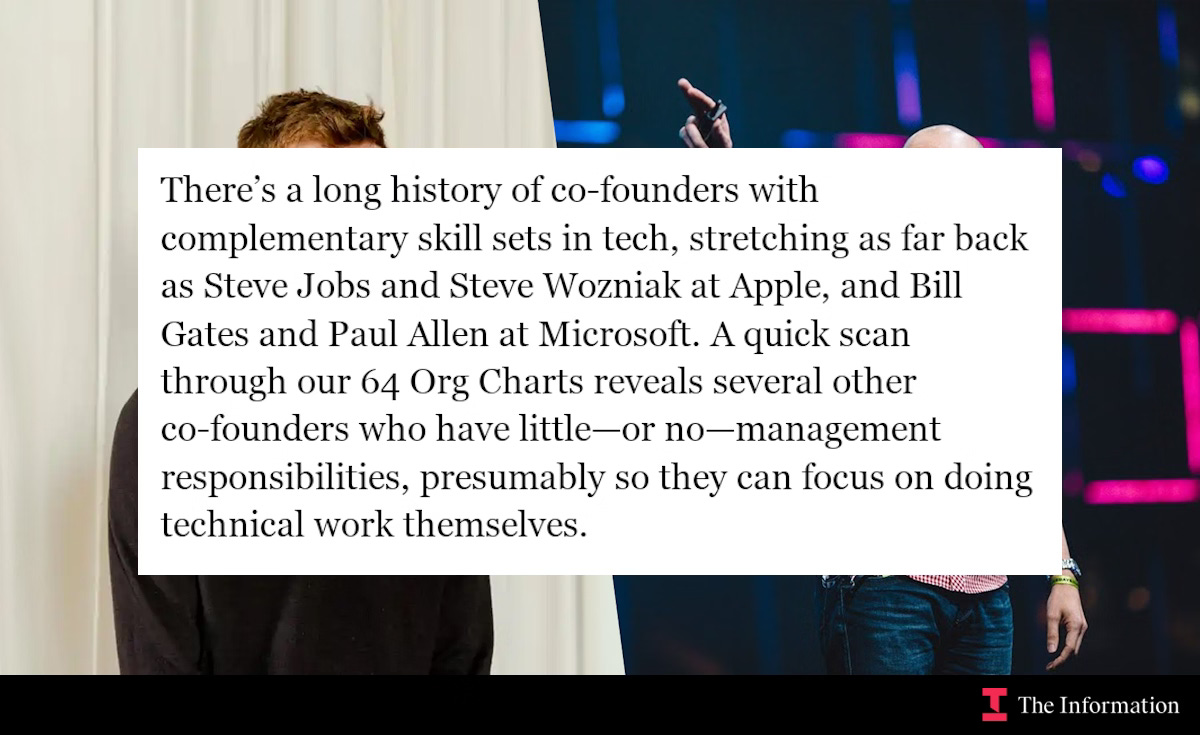Beyond the Co-Founder Cult
Rewriting Silicon Valley's Startup Playbook For Founders
Hey! This week we're diving into the world of co-founders in Silicon Valley startups. Our insights are inspired by a recent Information Pro newsletter that caught my attention. Let's explore why the traditional co-founder model might not be as crucial as we thought.
It’s time to change the way we build digital products
Keeping busy is easy. Driving business impact is what matters. Consistently align your people to the most strategic priorities, discover product opportunities from deep customer insights, and gain total visibility on execution with Airtable Product Central.
The myth of the essential co-founder
Silicon Valley has long championed the idea of co-founders as a crucial element for startup success. However, recent trends and data suggest that the most successful companies often have a single-minded, visionary leader. Take OpenAI, it has quickly been established over the last year who matters the most in that company, and his name is Sam Altman. This company started with over 10 “co-founders” and has whittled down to one clear leader of the $157 billion juggernaut. While I am sure old Sam wouldn’t have made it this far without his “co-founders” I wonder if that company had too many chefs in the kitchen and is now finally right-sized down to the right amount of leadership. Even if all those co-founders were essential, the structure has become the most controversial in the history of Silicon Valley, and that is a sign of too many people making decisions early in the lifecycle. It has led to Elon Musk suing the entity for morphing into a for-profit entity after he invested nearly $50 million for it to be a non-profit. I would even go as far as to say that most of the advice from programs like YCombinator is outdated in terms of how founders should think about starting new companies. There is so much optionality for talented people that the search for an equal-minded and complementary co-founder is like finding a needle in a haystack. This process alone can leave founders frustrated and at worst working on something while their “co-founder” has moved on to something else and often still holding a percentage of the cap table.
While so much programming has been dedicated to “co-founder matching” with YCombinator’s platform among other popular ones like CoFounder’s Lab, FoundersList, and entire channels and groups dedicated to it on sites like Reddit and Linkedin it feels like that is not where most early-stage founders should spend their time. The hit rates on platforms like this are alarmingly bad — and while new platforms like Nextplay among others are taking unique approaches, it is still a challenge to get someone to shut down their life and work with you relentlessly on a problem, much less do this for long periods with the stress of raising venture capital, finding product market fit, and building a unique product that is not already in the market — it helps to have money in the bank, some form of a design customer, and some sort of validity that you can win or at least reach a milestone where you can pay yourself a reasonable salary {more of my story}.
Key insights from our analysis:
According to the Information’s Org Charts on the Valley’s top companies — the key insights are many co-founders at successful Silicon Valley companies don't lead teams within the organization
Technical co-founders often prefer focusing on technical problems rather than leadership roles, and I would add things like sales, marketing, and fundraising.
The single-minded founder model has been exemplified in the past 5-10 years with various examples at the top of the market as well as with second and third-time founders who had frantic co-founder experiences before
The exception to the rule
While the trend points towards solo founders, there are exceptions. The two standout companies bucking this trend right now are Stripe and Anthropic. While they are in my opinion outliers there is one unique trait that stands out. What sets them apart? Both have co-founder duos who are siblings.
This family-driven co-founder model seems to offer unique advantages:
Strong emotional relationships that can weather the storms of startup life
Complementary skills and roles within the company
A built-in trust factor that's hard to replicate in "manufactured" co-founder relationships
To share more about the last factor, I think this is one of the real ones. It seems like co-founders who work well together have some kind of entrenched relationship. What is more entrenched than family for better or worse? This is something synthetic co-founder matching platforms cannot replicate. Meeting someone on an app and having a couple of Zoom calls is not an ideal way to start a company together. This also shows why it is so difficult to get these relationships right. It feels like the best co-founder model involves former co-workers, friends from school, or again some kind of familial relationship.
The perils of being a solo founder
I would not be truthful without sharing the perils that do exist with being a solo founder. I have been one of the better half of the last five years for a fledgling pre-Series A startup. One thing is true, it can be a lonely place to be. There is the reality that you can only see what you can see in terms of the market, the product, and the entire scope of the business. The other fact is the financial upside of your team is never going to equate to yours, so no matter how good of a recruiter you are there is still a limit to the upside you can offer your peers. Explaining how venture-backed startups work is difficult for solo founders because there is such a drastic difference between their approach and the first few hires. While the biggest challenge most venture types will allude to is technical or product-related the biggest difficulty I think is focused on your mind.
The takeaway for aspiring founders
If you're considering starting a company, think carefully about the co-founder model and do not over-index on it or think of it as a necessity to start a company and be successful.
I would advise:
Derisking your business idea first i.e. talking to prospects and getting a design customer willing to let you build a solution for their problem
Getting feedback on your ability to raise capital
Proof-testing your ability to recruit an atomic team before assessing whether you need a prototypical co-founder.
Early-stage startups are all about the team not the co-founders in my opinion. I like to use basketball examples and one recent one is the Boston Celtics. The two stars who are for the sake of this analogy “co-founders” are Jaylen Brown and Jayson Tatum. They are the longest-tenured Celtics, but they had been on the cusp of a championship for the better part of the past six years until finally breaking the seal in 2024. What changed? With the right team around them, they won a championship. While Brown and Taytum are the best players they acquired Jrue Holiday and Kristas Porzingus in the summer of 2023, and the ultimate “atomic team” was formed.
How does that relate? Well, it clearly shows NBA championship-caliber teams are not completely about two people so why do so many founders feel like they need that one other person to make their dreams come true?
why you should avoid “finding a co-founder”
Starting solo likely puts you in a better position than if you were blindly looking for a “technical co-founder” if you are not yourself or if you are technical hoping to find someone who can do all the “sales.”
While traditionally co-founder models can work and some VCs still skew towards preferring a two to three-person team in the early days, it's not a necessity for success and may even be counterproductive if you are lucky enough to break the ice and reach a Series A.
If you do choose to have a co-founder, treat it like a marriage - it requires commitment, communication, and the ability to weather ups and downs. While Stripe and Anthropic are outliers I do not find it odd that sibling co-founders are leading two of the most impactful companies in the current startup scene.
Remember, the most crucial factor is not whether you have a co-founder, but whether you have a clear vision and the ability to execute it effectively.
QUOTE OF THE WEEK
“Usually the technical co-founders are interested in technical problems,” - Russell Siegelman
That's all for this week! Stay tuned for more insights on the ever-evolving world of tech startups and entrepreneurship.
Keeping busy is easy. Driving business impact is what matters. Consistently align your people to the most strategic priorities, discover product opportunities from deep customer insights, and gain total visibility on execution with Airtable Product Central.




